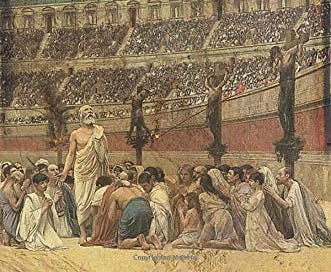If you are looking for the beginning of the study for Eusebius’ Church History then you can go HERE for a brief introduction. At the bottom of the introduction you will find the links to each section of the study guide as it becomes available. If you would like to see the growing list of book studies available for free on this site you can go HERE. Enjoy!
Virtues/Vices/Great Ideas: (Find them in the Text)
Irony, Providence
Grammar Questions: (The Information of the Text)
Whose letters did Eusebius find most helpful for writing this seventh book of his Church History?
What mistake made by emperor Decius did emperor Gallus fail to learn from?
What considerable controversy broke out about baptism?
What position did Dionysius of Alexandria take on the baptism controversy?
What was Valerian’s original attitude towards the Christian church and what changed it?
According to the text, why was Dionysius of Alexandria “forced to report God’s wonderful kindness?”
According to Dionysisus, why did God allow them to be exiled from Alexandria?
What “risky task” did Eusebius (the presbyter) perform?
How did things fare for the Christians once Valerian was no longer co-emperor?
Logic Questions: (Interpreting, Comparing/Contrasting, Reasoning)
Why did Dionysius say Novatus was guilty of falsely slandering “our most merciful Lord Jesus Christ as being merciless?”
Why did the “faithful member” desire to be baptized again after witnessing someone else’s baptism?
Aemilianus said to Dionysius “who prevents you from worshiping this god too - if he is a god - along with the natural gods?” From these words (and their context) what do we learn about the conflict between the Roman religion and the Christian faith?
Why was Eusebius' task of “laying out the bodies of the blessed martyrs” considered to be a very risky job?
Rhetoric Questions: (The Analysis of Ideas in the Text)
In our present reading there is a discussion about whether or not those who had “lapsed” in their faith (by offering sacrifices to the emperor or gods of Rome to avoid torture or death) should be rebaptized before being permitted back into the church. What do you think are some arguments for and against this notion of “rebaptism?” Do you think a person should ever be baptized more than once? Why or why not? Explain your answer using Scripture and plain reason.
In Dionysius’ discussion of the “rebaptism” issue he cites “the rule and practice I myself received from our blessed pope Heraclas.” Further he cites Deuteronomy 19:14 which says, “You must not move your neighbor’s boundary marker, set up by former generations.” How much weight (influence) should the practices of those before us, the traditions handed down to us, and precedent for how others have ruled on a similar issue, have on the decisions we make in our own day? What are the pros and cons of following tradition? What ultimately should settle the matter as to what we ought to do in any given situation?
Theological Analysis: (Sola Scriptura)
Bishop Germanus attacked the character of Bishop Dionysius of Alexandria, accusing him of being a coward who fled persecution. Read 2 Corinthians Ch. 10-12:13 and compare/contrast with Dionysius’ letter. What are some similarities and differences?



